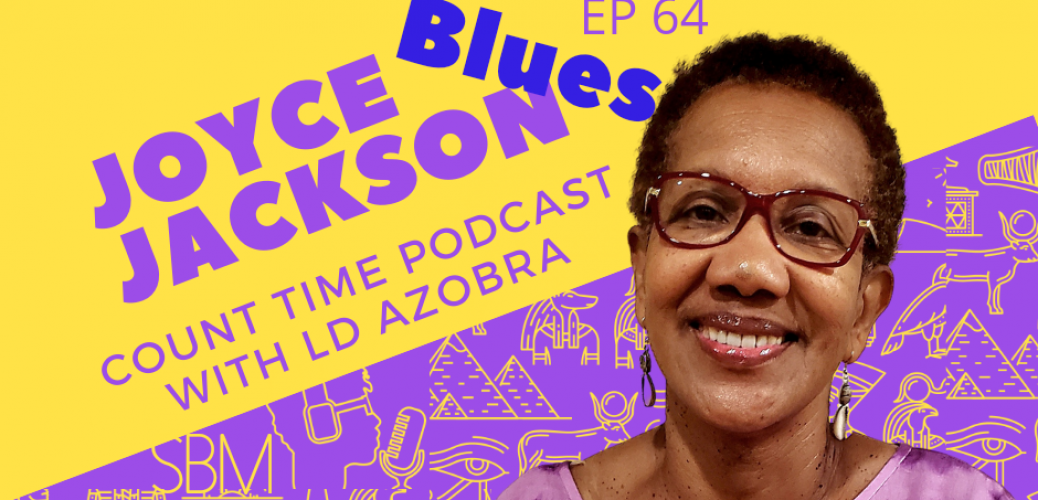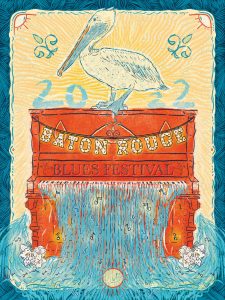Dr Joyce Jackson Blues
The ethnomusicologist on the Blues, origin stories and the mixture of colonizers that made Louisiana its likely birthplace. From the misery of the plantation to the classic blues decade of the women, the Harlem Renaissance to Louisiana festivals and everything in between. The Blues is alive and well.
If you haven’t yet, subscribe to the Count Time Weekly Alerts.
You will be added to our private community for comment, discussion and members only content.
Count Time Podcast Living Legend Dr. Joyce Jackson on the Blues
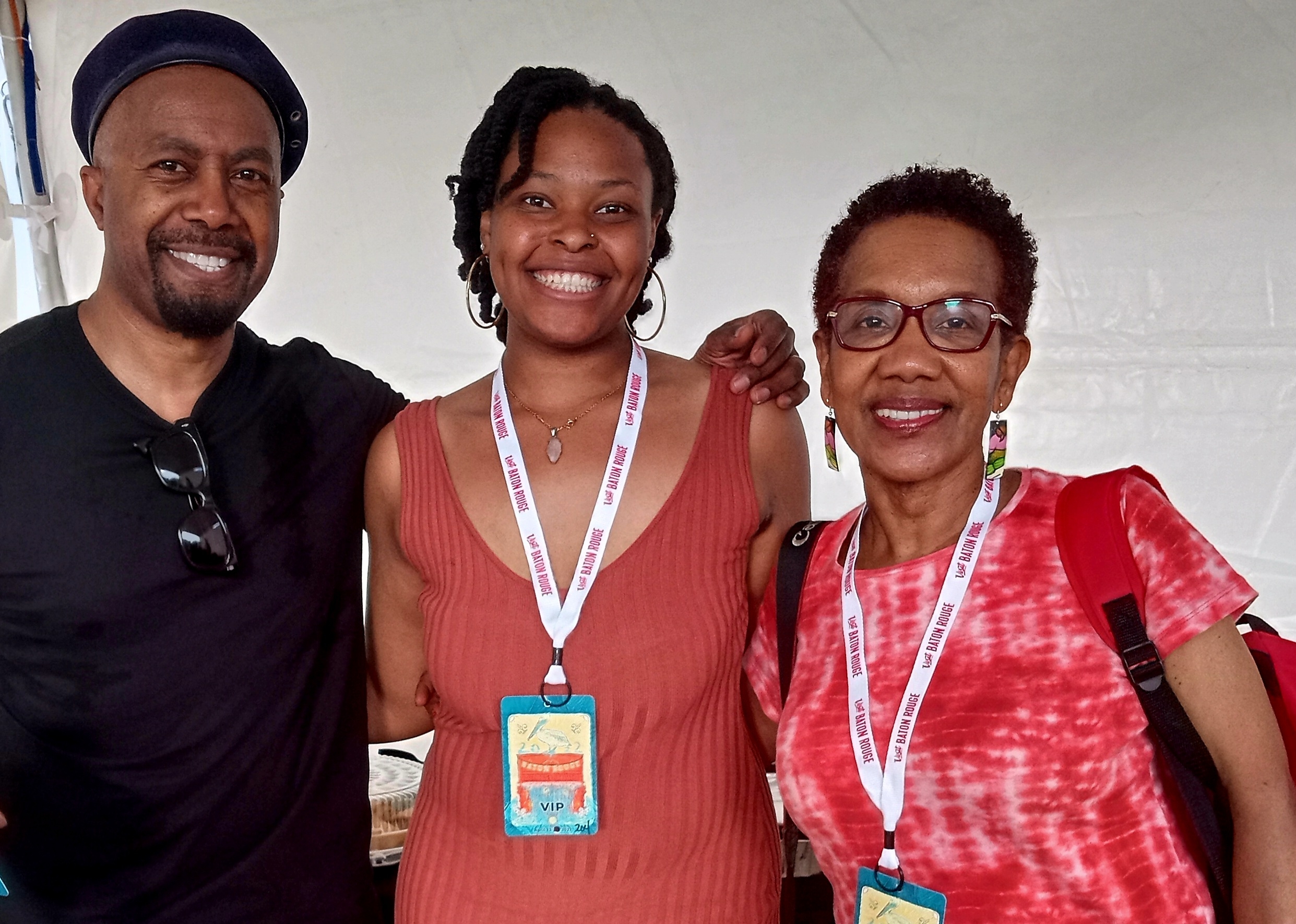
Selected quotes and notes from Count Time Podcast with LD Azobra Interview with Dr. Joyce Jackson
Good evening. Good evening. Good evening it’s 4:00 PM. Stand up it’s count time, time for every man and woman to stand up and be counted. Welcome to another edition of Count Time podcast. I am brother LD Azobra. Thank you for joining us today.
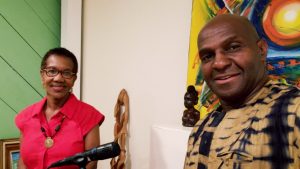
We have someone here who was here about a year ago, and she made such an awesome impact and impression on us that we had to bring her back because this lady knows her stuff. And we have here Madame Chair Dr. Joyce Jackson. Welcome again to Count Time.
DJJ
Well, thank you very much. Glad to be here.
LD
It’s that time of year in South Louisiana. It’s towards the end of the spring and the summer is moving in. The skies are blue, the sun is shining bright, and everybody is singing the Blues.
We did a story several weeks ago on there, the Neil family a guy named Rayful Neil, and Mother of the Blues, Ms. Shirley Neil. And you wrote an article years ago when I had a magazine called Refreshen Magazine on Raful. Do you remember that?

DJJ
Yes, I do, because he had passed then, but just passed. So I really got my information from his children.
LD
Now, what we’re going to do here today is that we’re going to do a How did the Blues come about? What is the Blues?
DJJ
Well, first, it’s a genre of music created by Blacks after the Civil War, during the Reconstruction era. And it was created during that time because of the changes that were going on within the community, within the black community. You find like before the Civil War, you had music, of course, being performed by Blacks, sort of like the entertainment for the planters during slavery. So they were singing they were playing instruments, basically string instruments during that time. And they were basically the entertainment. They would perform at the plantation homes, at restaurants and wherever else that whites wanted to be entertained. And of course, there were the work songs, the spirituals, and all of that was very prominent during the slavery period.
Well, the Blues came about most, you might say, scholars of the Blues during Reconstruction era, but because we know it was happening during slavery, but people start writing about it during the Reconstruction era and because things were changing. So the music was changing. So you have to look at the music. And I always say music is just a mirror of culture. So you can find out what is going on in the culture of a people by listening to the music, particularly the folk music.
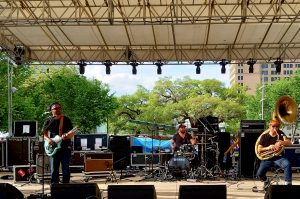
And this was coming out of the plantation era going into the Reconstruction era. Of course, Blacks were emancipated. After emancipation there were major migrations going from the south to the north, going from the rural areas to the city areas. You have many things happening and you’re coming out of slavery. You don’t have no type of economic clout. You don’t have no education. You don’t have any type of political clout. But you got to move now. You got to get off the plantation. Some actually stayed on the plantation.
LD
Yeah. Doing sharecropping work.
DJJ
And so they moved on. And then the music also moved on. So it changed. And the Blues developed. The country Blues developed during this time. And a lot of people say, well, it’s a Mississippi Delta. But we also have those like me and others say, well, it could have developed in Louisiana, too. We were going through the same thing that the folks were going through in Mississippi. And you have arguments for both sides.
LD
But I think Chicago claiming the Blues now.
DJJ
Well, the Chicago claim the Blues only because the people from the south moved to the north to Chicago. And so some of the same people going to Chicago and New York and moving north migrations. And that changed a lot of life situations for Blacks looking at the south and looking at the movement of the Blues in the South, Louisiana, Mississippi, Alabama, all those places. We were having the same conditions, basically. But Mississippi, a lot of people talk about Mississippi because that’s how the ethnomusicologist, the folklorist were writing about Mississippi more than any other area. You look at people like Charters and John and Alan Lomax, they were moving down from Washington, DC, from the Library of Congress to come down in the south to record folk music. They were folklorist. And that’s what they were coming here to record the music.
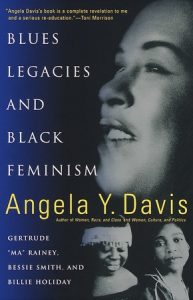
So where would they go? And you think, oh, what’s the worst area in the world for black folks during this period? They come in the they went to the south. They went to Mississippi because they knew it was just a really bad place for Blacks as far as economics and education, et cetera, et cetera. They were recording a lot in Louisiana, especially in the course they would go into the prisons, because where you have work songs, where you have a group of and they were targeting men more than women. And so where you have a group that’s just right there, very convenient for you to go and record.
And they were coming down with these huge recording units. We didn’t have the little tiny recorders and digital recorders that we have now. They had these huge units where they would come in and have them in the trunk of the car or the van, and they would take these recording units around to the prisons and into the black community.
LD
And you said the United States government paid people to come do this in the south.
DJJ
Yeah. Well, it was the Library of Congress. the Federal Library of Congress.
LD
So they paid them to come here to capture the history. Did they call it the Blues at the time?
JDD
Yeah, they were called well, by then. Yes, they were calling it the Blues. They were calling the Blues actually before then because that’s why some of the arguments are there for Louisiana. We know that a number of the traditional jazz musicians were playing the Blues before they start playing traditional jazz. That’s what part of that argument is because we not only have the recordings but we actually have the music itself saying something blue the blue in the title. Okay, in the title you have printed music and you have it in the title a lot of people look at WC handy writing the first Blues he had Blues in the titles of his music.
A lot of people credit him with that but we have the first recording of the Blues in 21 by Mamie Smith, a female a female Blues singer.
LD
Where was she from?
DJJ
Cincinnati. The musician was the composer and she wrote the lyrics. They coordinated and she performed in 1921 recorded on okay records. That was the first recording of the Blues done by a black woman and the crazy Blues was the title of the song. It sold 75,000 copies in the first month. That’s when the recording industry knew that the Blues would really sell so that was a very important production of that song. They only could do it if they used a white band and not the Mamie Smith band.

